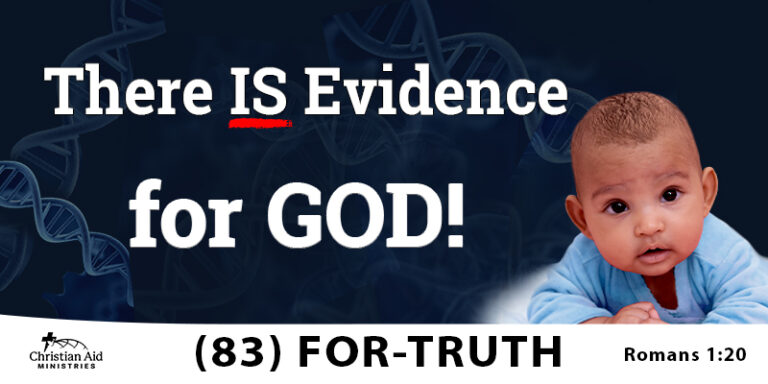People often ask, “Can you prove to me that there is a God?” One man angrily demanded, “If there is a God and He wants me to believe in Him; then why doesn’t he come down here and show himself so that I can believe?” Yet, one wonders, even if God had suddenly appeared in front of him, would the man have believed or would he have come up with some other explanation? If he has chosen to reject the evidence for God that does exist, would anything really convince him?
Interestingly, there are many things in life that we cannot prove with absolute certainty. Yet if something is supported by overwhelming evidence, we can be certain about it, even if it can’t be absolutely proven. The existence of God is one of those things. There are so many clues that point to the existence of God that we can be certain that He exists. When taken as a whole, these clues provide overwhelming evidence for the existence of God. Here are evidences of God’s existence that stand as signposts along the journey of life.
The Evidence of Life
Many scientists today claim that the world began when life sprang from non-living matter. Yet they are powerless to explain why spontaneous life cannot be produced in their laboratories today. They are unable to replicate the creation of life, thereby proving their inferiority to a Higher Power.
The Evidence of Creation
Whatever begins to exist has a cause. The Universe began to exist. What caused it? It only makes sense to assume that it was caused by one who preceded the universe. Who but God meets that criteria? Thus, our universe, including our planet, Earth, is powerful evidence pointing to God.
The Evidence of Design
We see design and order manifested in our created world through the earth’s precise rotation on its axis, its orbit around the sun, the tides, the seasons, and the ebb and flow of life designed to correspond to earth’s movements. “The brilliant hues of sunset must give way to advancing nightfall, and the star-spangled darkness never withstands the approach of dawn. Roses, snowflakes, and rainbows are signposts pointing to the infinite beauty of God.
A doctor explained that he came to believe in God through the study of sequencing DNA patterns. He said, “I realized that such intricate patterns could never be the product of random selection; there had to be a God.”
It stands to reason that wherever one sees design, there needs be a Designer!
The Evidence of Fine-Tuning
Our earth is perfectly designed to sustain life. Its distance from the sun makes it neither too hot nor too cold. It contains a complete system of life with interdependency between its many life forms. We breathe in life-giving oxygen and exhale carbon dioxide. Plant-life takes in carbon dioxide and produces oxygen. The balance we see in our natural world speaks of the order and control of an all-wise God.
The Evidence of Morality
People may differ in their definitions of right and wrong, and yet they all have moral codes by which they live. Even though people may lie, steal, or kill, there is an inherent knowledge that lying, stealing, and killing are wrong. Humans also demand justice for wrongdoing. Even those who declare that God does not exist and that the Bible is merely a human fabrication have a sense of justice which closely parallels Biblical morality. This built-in sense of morality is evidence for the existence of God.
The Evidence of Desire
Mankind has an intrinsic desire for God. Atheists may claim there is no God, but all over the world people’s behavior reveals an inherent urge to worship someone or something greater than themselves. Pascal said there is a “God-shaped vacuum” within every human being—a vacuum that is longing to be filled. Augustine said, “You have made us for yourself, and our hearts are restless until they find their rest in you.” The universal desire to worship points to the God who made us to find our fulfillment in relationship with Him.
The Evidence of Eternity
Why do nearly all world religions teach that death is not the end? Men hope for a better life to come. Men inherently believe that life has purpose, and eternity lends purpose to our existence. The hope of eternity in man’s heart is a signpost pointing to God who is inviting all people to come inhabit eternity with Him forever.
The Evidence of a Transformed Life
One of the most powerful evidences for the existence of God is a person marvelously changed from a self-serving life of sin into a person filled with loving concern for his fellowman. Millions of people from all over the world and from all walks of life have encountered God through Jesus Christ and have been transformed by His power.
Individually, these evidences answer some specific objections to the existence of God. Taken collectively, they provide overwhelming evidence that He exists.











21 Responses
I think it’s pretty [redacted] you guys try to guilt people into believing your god by putting a baby up on the billboard. Also, none of this is evidence, it’s just your theories
You are, of course, entitled to your opinion. However, you haven’t really provided any evidence supporting your criticism. You might even say it is “just your theory”. 😉
As far as providing evidence for God, don’t mistake “proof” for “evidence”. We do not claim to be able to provide proof, only evidence, and certainly there is plenty of evidence. Whether you consider the evidence to be strong or weak is your own prerogative. However, the existence of life, and the miracle of new life, certainly does lift our thoughts to serious questions of human origin and destiny. Secular scholars have many ideas about how life and biology works, but very little explanation for where it came from to begin with. Gottfried Leibniz’s famous question from hundreds of years ago, “why is there something rather than nothing?” is not easily shrugged off, if only one is open to consider it. I would challenge you to confront your own biases, and honestly consider the question.
Dear MZ (February 22, 2021 at 5:24 pm):
Sophistry (such as playing “word games”) isn’t very convincing as either proof or evidence. Sorry, chuckles, but those words are largely SYNONYMOUS! You provide PROOF for a claim (such as God exists) by producing EVIDENCE for that claim. Similarly, EVIDENCE that something exists is the PROOF that it exists.
As for “serious questions of human origin and destiny”, that is neither PROOF nor EVIDENCE of anything – except, of course, the curiosity of an intelligent mind.
As for the “failure” of “Secular scholars” to provide an explanation for where life came from (and how biology works), they’ve done a pretty good job so far. May I remind you that various “supernatural” explanations for where DISEASE comes from, and how it “works” (an important aspect of Life and Biology) were TOTAL FAILURES! If we still followed the notion that plagues were punishments from the gods (or God), or the work of demons, witches, elves (or whatever else people imagined) Smallpox and the Bubonic Plague (to name two examples) would still be the terror they were back in the Middle Ages. Fortunately, those Secular scholars you so demean found the “explanation”, with the result that Smallpox is ALL BUT EXTINCT, and Bubonic Plague is a rare event, no longer the dreaded “Black Death”! That’s a pretty good track record.
Leibniz’s question doesn’t have to be “shrugged off”, and “Secular Scholars” are busy finding answers to it. So far they’ve been able to answer much of the question. (Ever heard of the Big Bang?) Have they found the “ultimate” answer? No, but that’s the nature of Science. It’s not arrogant enough to claim to have all the answers at once. Which is why Scientists keep looking for answers – which is the only way to find them.
Of course, NONE of that is either proof or evidence for God. (Though, I will caution those I call ANTI-Theists that neither is it proof or evidence for the non-existence of God.) So the only HONEST answer to the question “Does God exist” is: I don’t know!
Thanks for taking to time to produce this response. I don’t think you and I are going to have a very fruitful discussion, and I’m not interested in a rhetorical jousting match, however, since this is a public forum I think it is appropriate to address a couple of your points.
Actually, evidence and proof are not synonymous. Of course, we can play semantic games and fight to control the definitions of terms, knowing that whoever gets to define the terms will with the argument. I suppose that in colloquial usage, there is a certain amount of overlap in meaning between the two words. However, in the sense that we are clearly using the term here, proof is the idea of establishing a fact or a claim beyond dispute. Evidence is simply giving reasons for thinking something is true. In this sense, evidence is what is used to establish proof. Our claim is that there is plenty of reason, or evidence, for thinking that the claims of Christianity correspond with reality. But we do not claim that the evidence is so overwhelming that it establishes the truth of Christianity beyond dispute. That’s all. I hope that helps.
And, speaking of word games, I’m not sure why you placed the word failure in quotes? As if to suggest that I had actually used the word myself to paint non-christian scholars as failures? Perhaps an attempt to put a more pejorative spin on what I said, to make it easier to stir up opposition to it? Well, I never said secular scholars are failures. I said they have not been able to offer an explanation of where life has come from, which they haven’t. Whatever the case, this forum would be more useful and worthwhile if we can avoid such games.
As far as faith keeping us in the darkness of terror, plagues and so forth, I would just point out that you have kind of picked a history that is not kind to your premise. No only have I not demeaned secular scholars, but it also wasn’t secular scholars who developed modern germ theory, sterilization, and vaccines. That would be the french scientist and Catholic Louis Pasteur, often called “the father of immunology”. (this is where we get the term “pasteurization” by the way. The bacteria pasteurella multocida, which causes fowl cholera in poultry and killed a whole bunch of my chickens a few years ago, was also named for Louis Pasteur) The man who developed modern germ theory, while never terribly outspoken on religion, and was perhaps a theological freethinker, did have this to say about religion and naturalism; “Posterity will one day laugh at the foolishness of modern materialistic philosophers. The more I study nature, the more I stand amazed at the work of the Creator. I pray while I am engaged at my work in the laboratory.”
I might also mention that Edward Jenner is also sometimes called “the father of immunology” for his game changing work in discovering a smallpox vaccination for which it said that he “saved more lives than any other man on earth”. However, since it was Louis Pasteur who helped us understand what we were doing with vaccination and developed the science behind it, the title often goes to him. Edward Jenner was also a committed Christian, though not also not necessarily outspoken.
And who might be “the father of microbiology”? That title goes to Antoni van Leeuwenhoek, a Dutch scientist and devout Calvinist, whos work laid the foundation for Louis Pasteur a couple centuries later. Leeuwenhoek was a lifelong critic of the popular idea that life could arise spontaneously, as is the only alternative to Creationism. As a direct result of his belief in a Creator, he rejected the popular notion of spontaneous generation, and conducted experiments and observations which led to the discovery of bacteria and microbiology. So, far from keeping humanity chained to the diseased ignorance and suffering of the middle ages, there is a decent argument that it was faith that led us out. As regarding the tiny creatures that he observed with the advanced, powerful microscopes that he devised, he said this, “We cannot in any better manner, glorify the Lord and Creator of the Universe, than that, in all things, however small soever they appear to our naked eyes, but which yet have received the gift of life, and power of increase, we contemplate the display of his Omniscience and Perfections with the utmost admiration.”
I have no doubt you really did believe that it was the free thinking of secular science, released from the supposed shackles of religion, which gave us modern medicine, vaccines, and sanitation, but you were wrong.
Dear Not getting one (February 22, 2021 at 4:16 pm):
I don’t see how using a baby involves “guilt”. Of course, neither is it PROOF. But as I’m sure you realize, despite what the Billboard says, this website “don’t need no stinkin’proof”!
As someone who has lost a baby to miscarriage, this billboard is painful to see when I pass it everyday and sends the exact opposite message as what you are intending. If a healthy baby’s is evidence that God exists, than what does it mean when that life is taken from you. What message does this send to grieving parents who have lost children, or those dealing with the pain of infertility. Is God less real for them? Is it proof of his inexistence? Please find a new visual for this message.
I am sorry to hear of your loss, and I am sorry that our billboard graphic has affected you as you have described. While the the existence of intelligent life does, I believe, indicate the reality of God, or some kind of life-giver, the loss of life demonstrates the opposite. Not the non-existence of God, but the reality of an enemy, a destroyer of life. The loss of life is something that breaks the heart of God, and in fact, the gospel story is fundamentally about the destruction of the power of sin and its consequent death and the grave, and the renewal of the possibility of enteral life for humans. John 3:16, perhaps one of the most well-known biblical passages, makes this priority of God clear. Here is the passage including the context of the passage before and after verse 16;
Joh 3:15 that whoever believes in Him should not perish but have eternal life.
For God So Loved the World
Joh 3:16 For God so loved the world that He gave His only begotten Son, that whoever believes in Him should not perish but have everlasting life.
Joh 3:17 For God did not send His Son into the world to condemn the world, but that the world through Him might be saved.
This is simply a rehash of all the half-baked arguments for “proof” raised for centuries, and DEMOLISHED for centuries.
Ultimately it rests on a FALSE dichotomy, one where the only choices are either God exists or God doesn’t. This is the same FALSE dichotomy which “informs” much of Anti-Theist arguments.
(I call people who actively oppose Religion Anti-Theists to distinguish them from people who simply don’t believe in Religion. That latter are truly Atheists, the former are something else.)
So, is there a “third way”? Of course, it lies in a simple act of Humility: admitting that we simply DO NOT KNOW! That, after all, is why Religion is a matter of FAITH. We can only have faith in (or reject faith in) things we DON’T know.
Think of it this way. It’s ridiculous to say one has “faith” in Gravity, since we all experience it every second of our lives. But it is certainly proper we have faith in various theories ABOUT Gravity (whether Newton’s or Einstein’s) – unless we’re scientists or engineers who’ve done the necessary experiments. The rest of us simply have FAITH that what we’ve been told about those theories is correct. It’s Faith, but not BLIND Faith.
So, in the end, it’s the Agnostics who are closer to the truth. They don’t pretend to know what may well be unknowable. Neither do they pretend that just because we don’t know means it doesn’t exist.
Here’s how the Bible says it. “Now faith is the reality of what is hoped for, the proof of what is not seen. For by it our ancestors won God’s approval. By faith we understand that the universe was created by the word of God, so that what is seen was made from things that are not visible…. Now without faith it is impossible to please God, since the one who draws near to him must believe that he exists and that he rewards those who seek him” (Hebrews 11:1-6). Read the rest of the chapter for illustrations of people who made this their motto in life.
Dear LB (September 21, 2020 at 3:32 pm):
[redacted]…. The so-called “New Testament” has NO AUTHORITY so far as I’m concerned, and is “evidence” of nothing …. [redacted]
Then we have no common ground for further discussion. LB
LB: You could certainly discuss why you think the New Testament is or isn’t a reliable source for history or cosmology or morality.
Yes, I could do that. However it is evident that he has no interest in what I think. He just wants to make a fool out of me, which is okay. But I have other things to do and don’t like spending my time that way. There are various posts on this site and others that make those points. My point is that if we can’t agree that the New Testament gives a reasonably accurate account of history, then we have no place of agreement to start a discussion on. It is one thing when people just believe that the NT wasn’t inspired and maybe even that God doesn’t exist. But there is lots of evidence for the veracity of the history in the NT. But thanks for the reminder.
The “Evidence of Life” section is not correct. The construction of living organisms from chemicals *has* been performed in laboratories, and simply involves the assembly of DNA, proteins, and cellular containers. The evolution of complex life from single-celled organisms took billions of years because it operates on the scale of many generations of organisms, which is why say, we can’t do an experiment to evolve rabbits from dirt in one year or something.
So it isn’t really science, is it? You can’t use the scientific method to prove it. At the best your results can only produce a theory which can never be proven. I haven’t posted your other comments since they have been answered many times over by people more qualified than I am. Questions about the origin of God are especially outside the scientific realm and are philosophical in nature.
You see using the word “evidence”. I don’t think it means what yo think it means.
Those thing are not evidence of a god let alone the christian god. They are empty claims. Nothing more.
It depends on your perspective, I suppose. The worship of chaos fits into today’s chaotic world very well. The problem is that chaos destroys. Always. The existence of beauty, music, literature, love, morality all show me an overarching power interested in my good.